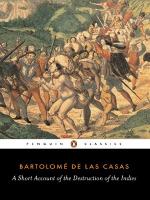|
This section contains 656 words (approx. 2 pages at 400 words per page) |

|
A Short Account of the Destruction of the Indies Summary & Study Guide Description
A Short Account of the Destruction of the Indies Summary & Study Guide includes comprehensive information and analysis to help you understand the book. This study guide contains the following sections:
This detailed literature summary also contains Topics for Discussion and a Free Quiz on A Short Account of the Destruction of the Indies by Bartolomé de Las Casas.
A Short Account of the Destruction of the Indies was written with the task of informing the King of Spain about the murder and gold hoarding that was occurring in the New World. The purpose of the expeditions was primarily to convert the natives to Christianity and save them from eternal damnation. However, the Spaniards that were sent did not abide by the rules they were given and killed millions of people for their gold. Only a small percentage of the gold they took was given to the Spanish purse. Christian missionaries such as De Las Casas were also present and did their best to try to bring justice to the lands.
According to De Las Casas and the other friars who were either Dominican Friars or part of the Order of Saint Francis, the natives were the most docile people they had ever met. Every time a Spanish group of men entered their territory they welcomed them with open arms. Most of the time they were too welcoming and were eaten out of their homes. However, this generosity was their custom and the Spaniards could count on it. The soldiers actually used this hospitality as an advantage to pillage the cities and villages since they were faced with less opposition. This allowed them to get the gold, jewels, and slaves that they so desired quicker and with greater ease. The Spaniards massacred millions of natives as a result, raping women and killing innocent children and infants along the way. Those that were not killed were taken as slaves and sold in Peru and Hispaniola where they got the best prices for them. The slaves were used for everything from carrying packs, building large buildings, pearl diving, and even attacking other villages when the Spaniards didn't want to use their own men. Once they were sold they were worked to death within months, sometimes even days because they were overworked and never fed. The majority of the natives died en route to being sold as slaves on the ships and simply thrown overboard.
De Las Casas goes through only a handful of the different accounts of genocide, but sufficient to prove his point. Many letters were sent to the King of Spain describing the horrible things that the Spaniards did in the New World. However, the mere injustice that occurred with the lives of innocent people was not enough to spur the nobles in Spain to action. Even though it was their policy to convert the natives and protect their souls, they had a different agenda. Though they never gave any real reason for the lack of concern for not carrying out their mission of converting the natives, it can be assumed that it was due to money. De Las Casas never makes this assumption because of his devoutness to the Spanish crown but it is quite obvious. Since the Spaniards horded most of the gold that they stole from the native villages and gave only a tiny fraction to the Spanish royal treasury, it was a higher priority for the Spanish nobles to recover the stolen gold and to prosecute the soldiers. There was never any action to protect the native people who did all they could to succumb to the Spanish Crown's wishes, even swearing allegiance when given the chance.
The leaders of Hispaniola, who were the most loyal to Spain, were hung or burned alive. Many more innocent natives were thrown and fed to wild dogs, butchered to pieces by Spanish soldiers, or drowned to death while pearl diving. Millions suffered and died because of the ruthlessness and barbarity of a few Spanish commanders and hundreds of their evil men. De Las Casas' commitment to saving the natives and to uncovering the truth of the conquest of the New World is astounding. He never gives up and struggles throughout his life for a cause that seems impossible to achieve.
Read more from the Study Guide
|
This section contains 656 words (approx. 2 pages at 400 words per page) |

|



